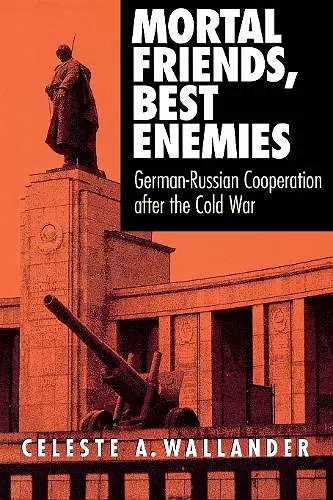Mortal Friends, Best Enemies
German-Russian Cooperation after the Cold War
Format:Paperback
Publisher:Cornell University Press
Published:24th Mar '99
Currently unavailable, and unfortunately no date known when it will be back
This paperback is available in another edition too:
- Hardback£108.00(9780801435812)

Several hundred thousand members of the Red Army were stationed in East Germany when that state was reunited with its western counterpart. The peaceful transfer of these soldiers to their homeland produced a welcome outcome to a potentially explosive situation. Through an investigation of the strategies of German and Russian decision-makers, Celeste A. Wallander explores what conditions facilitate or hinder international cooperation in security matters.
Wallander spent the months and years after the fall of the Berlin Wall interviewing officials and politicians from Germany and Russia. She reveals how these individuals assessed and responded to potential flashpoints: the withdrawal of Russian military forces from Germany, the implementation of arms control treaties, the management of ethnic and regional conflicts. She also examines the two states' views on the enlargement of NATO.
The first detailed account from both countries' perspectives of the extraordinary contraction of Russian power and the implications of German unification, Mortal Friends, Best Enemies clearly depicts the important role European and global institutions played making the military disengagement possible. Wallander draws on these findings to develop a new institutional theory of security relations. In it she defines the techniques that international institutions can use to help states solve obstacles to security.
Celeste Wallander has written an excellent book, one that will appeal to Europeanists, post-Soviet scholars, and especially theorists of international relations... The issue is no longer whether institutions matter (we know they do) but how they have effects. Do they constrain state strategies or constitute core state properties? Wallander's book should be a model for both rationalists and constructivists as they debate these issues in the years ahead.
-- Jeffrey T. Checkel, Universitetet i Oslo * American Political Science Review *Recommended for international and security relations collections in larger public and academic libraries.
* Library Journal *Relying mainly on interviews with senior politicians and foreign and defense officials in Germany and Russia, Wallander also takes advantage of the opportunity to assemble the public record of the range of issues in German-Russian relations since the end of the Cold War. The reader will find concise, informative presentations of the following: withdrawal of Russian forces from the former East Germany, renegotiation of the CFE to accommodate Russian demands for larger forces in the troubled North Caucasus, Russia's relations with other members of the Commonwealth of Independent States, problems of migration with other members of the Commonwealth of Independent States, problems of migration into both countries, NATO enlargement, international aspects of Russian economic and financial reform, and (all too briefly) Russian and German policy toward the breakup of Yugoslavia....Wallander has written a fine book.
-- Richard Anderson * Slavic ReviISBN: 9780801486081
Dimensions: 235mm x 155mm x 16mm
Weight: 454g
256 pages